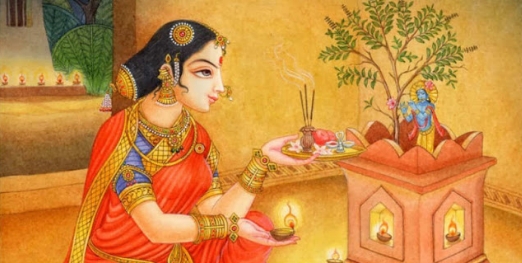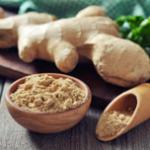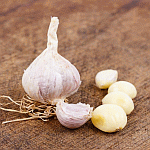
Das heilige, indische, "unvergleichliche" Basilikum: Tulsi
09.02.2018 | In Indien wird Basilikum - dort bekannt als Tulsi/Tulasi/die Unvergleichliche - als heilig verehrt. Es ist dem Gott Vishnu geweiht, dem Erhalter und Beschützer des Universums. Tulsi stärkt das Herz emotional wie physisch, verbindet somit Herz und Seele und entfacht das Agni, unser Verdauungsfeuer. Vaidya Mishra beschreibt welche Wirkungen Tulsi sonst noch zugeschrieben werden. Artikel in Englisch.
Incomparable Tulsi for Immunity & Spiritual Shakti
Beyond Compare
The literal meaning of the Sanskrit word tulsi (or tulasi) is "beyond compare." More than any other plant in Vedic culture, the Tulsi plant is known for her divinity. Tulsi is sometimes called "surasa" (liked by the gods) and "devadundubhi" (who carries a divine vibration).

The legend goes that Tulsi was once an extremely beautiful yet very difficult young woman who would not accept any man as husband unless he was 100% perfect! Her resolve to marry only he who would prove to be divine in all his attributes brought her to God.
The Bhagavad-Gita speaks of many paths to God, amongst which the path of renunciation (sannyasa). All paths lead to ultimate truth. But Tulsi chose the path of renunciation ("neti neti" - not this, not this) in rejecting the hand of any man who was not fully perfect. Her super-high standards of perfection made it impossible to find the right match. Only the Aditattwa, original pure field of Being, Vishnu, had this degree of perfection. Tulsi engaged in sacrificial acts, tapas, and worshipped Vishnu with such purity of devotion that even though he was not available for marriage, he made sure that his divine influence would always accompany her. Tulsi was reborn as the tulsi plant that carries innumerable healing divine properties, and is worshipped in all vedic households in India to this day.

Tulsi (or Tulasi)
Tulsi Is Good For The Heart and Mind
It is no surprise that tulsi supports the emotional, physical and vibrational heart. Our connection to the light of our souls lies in the heart. Tulsi is so connected to the universal soul, or God, her presence in our homes, our lives, ushers in that divine universal vibration, which directly strengthens the emotional and physical heart. This is why Bhava Prakash gives tulsi the classification of "hridya" - that which gives a long, healthy life to the heart by delivering prana to the heart.
When the heart's vibration is pranically elevated thus, the mind also gets anchored and recharged, and it becomes easy for the mind to stay connected to the light of the soul. Because of this, the senses are not able to easily overtake the mind, since the mind becomes anchored in the pure field of Being vibrating in the heart. This is why tulsi is an important part of Vaidya Mishra's Samadhi Set. Countless SVA followers use the Samadhi set before yoga, prayers, or meditation. It helps them settles down by unclogging the vibrational and physical channels, supplying more prana, and the divine healing herbs, so the experience of meditation or yoga or more complete.
Tulsi opens the heart to the field of Being. The light of Being illuminates the mind and gives it strength. The strong, peaceful mind is able to fully enjoy its yogic state of sama-dhi, balanced intellect radiating bliss.
But the Tulsi plant also carries very powerful properties for the physical body and health.
Spiritual Shakti or Strength
The physical properties of any herb affect the physical elements of the body, while its subtle vibrational qualities work in the vibrational gaps of the physiology, where all transformations in the body take place. The gaps or sandhis carry burners or centers of transformative energy. These gaps is where the intelligence of the body is located. Whenever you ingest or transdermally absorb an herb that is rich in divine intelligence, like tulsi, you naturally activate the gaps (or burners) in the physiology. The vibration of the tulsi plant is purifying for these gaps and makes them more intelligent.
The word in Sanskrit for this property is dipani. Any herb that is dipani increases the flame in one or more of the gaps of the physiology. This can be done by cleaning the gap (removing blocks to the flow of prana in the gap), or by directly supplying more agni. Tulsi does both.
Tulsi has ushna virya (heating thermogenic property) which delivers agni-rich prana to the burners, especially the jataragni (burner of the stomach) to ignite the digestive flame. And tulsi also has a divine vibration which travels directly to all the gaps throughout the physiology.
This divine quality helps it to remove any hidden vibrational blocks and to clean the gaps in the physiology. This makes the agnis (flames) stronger throughout the body, including the agnis in the mind and the liver.
When the body's subtle transformational powers are reset by tulsi, the body is able to receive and connect with universal energy optimally. Tulsi is thus an ideal herb for restoring and maintaining spiritual shakti in times of distress. It purifies and elevates us through its physical and vibrational cleansing properties.

Shakti Altar
Bactericidal Effect of Tulsi
Bhava Prakash uses two words, "apetarakshasi" and "bhutaghni," to give emphasis to the bactericidal property of tulsi.
The word, bhutaghni, in Sanskrit means "bactericidal." Bhuta, in Ayurveda, denotes microscopic bacteria or living entities that are invisible to the naked eye, but the terms also refers to spirits - which can be a hidden nuisance as well! The word, "apetarakshasi," also means "bactericidal." Rakshasa is another name for disease spreading micro-organisms in Ayurveda.
The divine chemical make-up of the tulsi plant creates an unwelcome environment for such infectious organisms. The bitter taste (tikta rasa) of tulsi is also an important factor in killing bacteria (or at least making it very difficult for them to thrive). For this reason, tulsi has been used to boost the immune system and fight colds for centuries. The combination of being bactericidal, increasing agni (digestion) and connecting the mind to the light of the soul makes this an ideal herb for strengthening immunity. In terms of doshas, it pacifies high kapha and vata. It can be pitta aggravating, so it should be used with caution by high pitta individuals.
Cautions for Using Tulsi
According to BhavaPrakash, tulsi is ushna (heating), katuka (pungent) and dipani (flame enhancing). For anyone who has a high pitta constitution this can cause burning or other pitta related problems, so use in moderation. In fact, Bhava Prakash warns that tulsi is dahapittakrit - increasing pitta and aggravates burning in the body.
Tulsi should be used in moderation, according to the specific state of balance of the person in order to avoid this problem.
Also, because it is bitter, tulsi should not be used during pregnancy to avoid a miscarriage, unless it is used under the doctor's supervision. Bitter herbs stimulate the liver to detoxify itself and can transfer too much amavisha (reactive toxins) into the blood, causing a miscarriage.
Chandi LLC/ Vaidya R.K. Mishra

Vaidya Mishra's Prana Center
SV Ayurveda services & products to help you stay in balance & bliss 365 days a year, 24/7!
Dieser Artikel erschien am 20.01.2018 hier: https://www.facebook.com/SVAyurveda/posts/1558194727603197 und wurde mit freundlicher Genehmigung von Vaidya Mishra im ayurveda-portal.de veröffentlicht.






.png)
.jpg)



